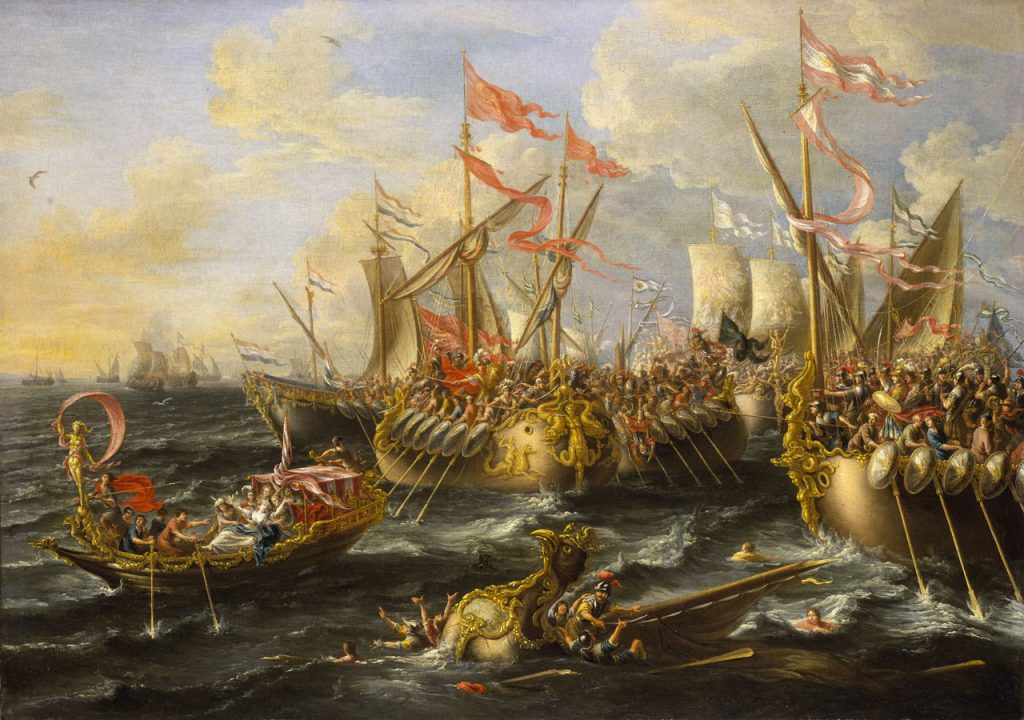The years 34-31 B.C.E. was a difficult time for the Roman Republic. The Republic had been divided in two, with general Marc Antony ruling in the East and Octavian in the West. However, in the years leading up to 31 B.C.E., Marc Antony had spent all his time in Egypt with his lover Cleopatra VII. He had also begun giving away Roman lands to Cleopatra and their children, essentially depriving Rome of some of its most valuable provinces. Antony was certainly interested in founding his own dynasties in the East that would be entirely separate from Rome. All this was a bid for power. The final blow Antony delivered was when he decided to divorce his Roman wife Octavia, Octavian’s sister, so he could legally be with Cleopatra. Octavian was enraged. He could not stand for this. Antony’s actions had embarrassed him, his family, and Rome. From that moment on, Antony and Octavian were enemies, each vying for control of the Republic. The two men set off to face each other. Both men wanted to rule the world, but only one man could prevail.1
So it was that the two most powerful men in the world had now to face each other. They were both competing for their lives, and for control of the Roman Republic. Antony was certainly favored to win. He had the wealth and resources of the East behind him. He set out with his forces to Greece. Cleopatra followed him with ships packed full of treasure, and they both camped together in the city of Ephesus. While there, they camped in great opulence and style. From Ephesus, they were ferried over to Greece. It was while he and Cleopatra were in Greece, that Antony began to assemble his forces properly. The population of Greece was called upon to make huge sacrifices on behalf of his army, including large amounts of lumber, money, and even men. Cleopatra herself contributed almost two hundred vessels from her navy.2 All together, the lovers were able to produce a force of 130,000 troops and over 500 ships. An extremely powerful force. Octavian was young, and compared to Antony, he was inexperienced. The western half of the Republic, which Octavian ruled, could not hope to offer the wealth and resources Antony had. Many people expected him to lose. Nevertheless, Octavian had at his command a contingent of 400 ships and 80,000 soldiers. However, Octavian had one advantage Antony did not. Octavian had leading his forces the renowned admiral and strategist Marcus Vipsanius Agrippa. Antony should have had the advantage, but due to Agrippa’s skill, he soon found himself in a disadvantageous position.3
Antony and Cleopatra waited with consternation for Octavian and Agrippa’s first attack. Finally, at the close of winter 31 B.C.E., Agrippa attacked Antony’s southern-most outpost of Methone, a small port city, which was quickly overrun. The attack came as a shock to both Antony and Cleopatra. They had expected the attack to come in the north, and they had planned accordingly. Rather, it had come in the south, and they now were forced to make adjustments. Antony was caught off guard once more when Octavian landed with his forces in the city of Panorma. Antony must have sensed that the time for the final battle was approaching, so he set off for the city of Actium, where the bulk of his forces were based.4

Antony arrived at Actium with his army, and joined his navy in the Gulf of Ambracia. Meanwhile, Octavian arrived at the southern half of the promontory setting up camp on one side of it, while he positioned his forces around his camp and outside of the Gulf of Ambracia. Antony immediately began encountering problems. Octavian’s forces besieged his supply lines, and cut off his food supplies, forcing many of his soldiers to look for food among the local population. Antony had also camped in an area ripe with mosquitoes, and many of his soldiers got very sick with malaria. Morale in Antony’s army dropped quickly, and many soldiers and allies began to defect to Octavian. It was around this time too, that Agrippa, after capturing the strongholds of Leucas, Patrae, and Corinth, arrived with his fleet. Antony’s fleet was trapped for good. Antony would now have to fight if he wanted to break out of the gulf. Antony now had only two options. He could either attempt to retreat with his forces on land, and hope to draw Octavian to him, or he could use his fleet to break out of the gulf. On the night of September 1, 31 B.C.E., after conferring with the leaders of his forces, Antony made the decision to fight his way out of the gulf.5

On the morning of September 2, 31 B.C.E., Antony’s forces, which included three main groups of vessels, ventured out of the gulf. One group situated on the left flank was commanded by Sosius, the center flank was commanded by Antony himself, and the right flank was commanded by Gellius Publicola. Behind them was trailing Cleopatra with sixty ships laden with treasure. Octavian’s forces were arranged in a similar manner to Antony’s, with his main body composed of three main groups. Octavian himself commanded the right flank, while Lurius commanded the center, and Agrippa the left flank. With the two opposing forces formed up, the two fleets faced each other in an intense stand off that lasted for three hours. Finally, the wind shifted, and Antony ordered a general advance. Agrippa seeing this, ordered all forces to backwater. He wanted Antony to expose his forces more. And Antony took the bait.6
Finally, the two sides clashed. Antony’s large lumbering galleys battled with the swifter smaller vessels of the opposing fleet. The smaller crafts repeatedly rammed into the larger ships.7 Agrippa ordered his soldiers to use flaming projectiles. This tactic was moderately successful, and some of Antony’s ships went up in flames. Agrippa then ordered his forces to surround Antony’s vessels. However, this maneuver was countered by one of Antony’s lieutenants. As the battle between the two fleets raged on, a gap opened between them. This gap was just what Cleopatra had been waiting for. When she saw the gap she ordered her ships to hoist sail and pass through it. Her ships did this, and then they sailed off, bound for home. Both sides were shocked. It was, after all, an audacious feat to attempt in the middle of a battle. Antony, after watching Cleopatra’s escape, gave over command to one of his lieutenants. His orders were to have the rest of the fleet follow him back to Egypt. Then he too departed after Cleopatra, leaving his fleet and much of his army behind.
Antony’s men were utterly shocked. No true Roman general would ever abandon his forces. But Antony had done just that. From that moment on, chaos ensued. Octavian and Agrippa continued to set ships ablaze. Many sailors jumped ship and swam to shore, where they dispersed into the the countryside. Those few ships that remained returned to the Gulf of Ambracia. Octavian and Agrippa merely trapped them inside the gulf again, totally unconcerned. The enemy fleet had been vanquished. On land, the remnants of Antony’s forces attempted to march on, but the soldiers would not march without Antony, and he had betrayed them. They no longer felt any loyalty towards him. Within a week, almost all the soldiers defected to Octavian. The battle for control of Rome was over. Octavian was the clear victor.8
Antony and Cleopatra fled back to Alexandria where they lived a life of numbing pleasure and debauchery. But Octavian made his way to Egypt in 30 B.C.E. Upon hearing of his arrival in Egypt, Antony did the honorable thing and took his own life on the 1st of August 30 B.C.E. Cleopatra was captured by Octavian, but she did not want to give him the satisfaction of displaying her as a trophy. So she too took her own life on the 10th of August. All this suited Octavian just fine. He was now master of Rome and of all of its territory. He would not have to share his power with anyone anymore. He was supreme. The Battle of Actium had made him so. It was the battle that ended the Roman Civil Wars for good. Octavian went on to crown himself the first emperor of the Roman Empire. He founded a dynasty that would rule a vast and powerful empire for generations. It was an empire with enormous influence, political as well as cultural and economic. It all began at Actium.9

- Guglielmo Ferrrero and Corrado Barbagallo, A Short History of Rome, vol. 2, The Empire: From the Death of Caesar to the Fall of the Western Empire 44 B.C- 476 A.D (New York: Capricorn Books, 1964), 54, 58. ↵
- Adrian Goldsworthy, Antony and Cleopatra ( New Haven: Yale University Press, 2010), 349-350. ↵
- The Greenhaven Encyclopedia of Ancient Rome, 2002, s.v. “Battle of Actium,” by Don Nardo. ↵
- Adrian Goldsworthy, Antony and Cleopatra ( New Haven: Yale University Press, 2010), 360-361. ↵
- Adrian Goldsworthy, Antony and Cleopatra ( New Haven: Yale University Press, 2010), 361-362. ↵
- Adrian Goldsworthy, Antony and Cleopatra ( New Haven: Yale University Press, 2010), 366. ↵
- Nigel Rodgers, Roman Empire (Wigston, Leicester: Hermes House, 2006), 193. ↵
- Adrian Goldsworthy, Antony and Cleopatra ( New Haven: Yale University Press, 2010), 366-369. ↵
- Salem Press Encyclopedia, 2013, s.v. “Battle of Actium,” by Roger B. McShane and Michael Witkoski. ↵




20 comments
Gabriella Parra
Great article! You outlined the events of the battle in a very clear to understand way. It’s amazing how much can change in a single battle, and how Octavian accomplished such a huge feat at a disadvantage. It’s interesting that Octavian was able to beat Mark Antony who was more experienced than him. It was definitely in large part the expertise of Agrippa that made this possible.
Yanelle Nicholson
The author of this article explains what happened between Octavian and Marc Antony in detail. With the use of the map and explaining what happened we can picture it better and help the reader understand how the battle took place and where both sides were located. Also, the author provides in the reading everything to help us understand why the battle took place and why it happened.
Idaly Oropeza
Marc Antony was a general for the East part of the Republic and Octavian was the general for the west part. Both men faced each other in war to see who got to rule the world. Antony was the peoples favorite and wanted him to win because he had wealth wisdom and the whole east side behind him. Cleopatra helped him with many sources like troops and ships. The only disadvantage he had was that he didn’t have Agrippa’s health. Antony and Cleopatra were caught off guard when they attacked from the south. It is said that Antony must have knew this was going to be the last battle so he made his way towards Actium. Once they got to Actium Antony noticed his food supply source was down for his army leaving them to find some locally. The last three hours were fought in a stand off. The rest of the fleet was to follow him back to Egypt, according to his instructions.After that, he followed Cleopatra and left behind his fleet and a lot of his army. The battle brought an end to the Roman Civil Wars forever.After that, Octavian crowned himself the first Roman emperor.He established a dynasty that would for many generations lead a vast and powerful empire.It was an empire with a lot of political, cultural, and economic power.All of it began in Actium.
This story connects to our lecture because of the way that we are learning about the Roman Empire right now. This battle was very significant in the history. This story has strong details that can allow students to visualize how some wars and battles were fought back then.
I want to say what an awesome article this is. You told the story in a great way of making it fun to read. Each picture you used connects extremely well for the article.
Ian Mcewen
war is always a complex subject due to many factors weighing together, size of troops, supply lines, tactics of armies, positioning of the armies, and many more. it is also an expensive in the short and long term, to supply everything weapons, food, and care in the short term, and the loss of life and potential work force in the long term with the gains being hoped that they would alleviate long term costs.
Davis Nickle
Actium is probably one of the most influential battles of the classical world. The clash of the two great caesarians Marc Antony and his rival Octavian would end up determining the course of history not just for Rome but for the entirety of Europe. This is also a great example of how brilliant Octavian’s general Agrippa was on the field of battle. It is sad that the ambitions of two great men came into conflict, but this battle was necessary for the founding the Roman Empire.
Carlos Serna
I knew about Octavian and that he became emperor after what happened to Julius Caesar, but I did not know that he had to fought against his rival Mark Anthony to become the first emperor. Also, the Roman Republic was falling apart, and it needed a new way to rule. I believe that if it were not by Marcus Agrippa maybe we would be commenting a different story.
Analisa Cervantes
I first learned about the Battle of Actium in high school. Most of this article was familiar to me. However, some of the information on this article is new to me. I did not know that Octavian had a sister named Octavia or that she was married to Marc Antony. I can see why Octavian was furious when Antony left his sister for Cleopatra. I find it interesting that Marc Antony and Cleopatra were willing to give up everything, including power, to be together.
Michael Leary
Very interesting article, I had not heard too much about this battle before, so it was nice to read about it. It found it interesting how the Battle of Actium should had been Antony’s victory, number wise, but, Octavian had more strategy. It seemed very dishonorable how Cleopatra and Antony left the battle while there were troops still on the field.
Oscar Ortega
This article was very descriptive and well-written. The Battle of Actium is one of the most famous and important in the History of Rome, and not only is the history of the struggle prior to the final battle given just the right amount of attention to inform readers who aren’t familiar with the history, Octavian, Antony, and Cleopatra’s roles all described in fine detail, and the battle itself and it’s aftermath are all presented in a clear and concise manner.
Christopher Hohman
Nice article. The Battle of Actium was of tremendous importance to the ancient world. If Octavian had lost the battle who knows what world we might be living in today. We good be looking at a world that was more Greek. Antony and Cleopatra had their chance to win the world for themselves, and they failed. Octavian was victorious and crushed his rivals. And with him the Roman Empire was formed.